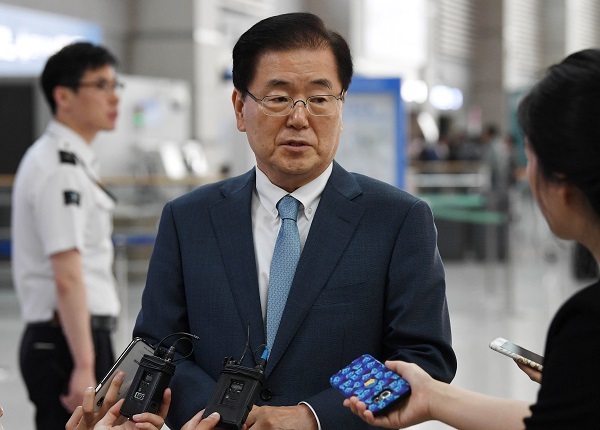The deployment of the US’ Terminal High Altitude Area Defense anti-missile system could be delayed by environmental assessments, South Korea’s top national security adviser hinted Thursday.
National Security Council chief Chung Eui-yong is in the US on a two-day trip to prepare for the South Korea-US summit slated for late June.
Speaking to reporters on his trip to the US, Chung said that environmental studies would be conducted before the THAAD system is fully deployed. At present, two THAAD launchers are in place in Seongju, North Gyeongsang Province.
 |
Chung Eui-yong, chief security advisor to the president, speaks to reporters at Incheon International Airport, west of Seoul, before departing for the United States on June 1, 2017. (Yonhap) |
“I think that (full deployment) could take more time if (Seoul) is to conduct a stringent environmental study,” Chung said. He added that President Moon Jae-in has expressed the need to make related processes more transparent.
Chung also denied that US Sen. Dick Durbin told Moon that the US could redirect the $923 million related budget required for the THAAD deployment if Seoul deems the equipment unnecessary.
According to Chung, rather than stating that the budget could be used elsewhere, Durbin informed Moon that the issue was being discussed in the US Senate.
A full battery consists of six launchers, and the remaining four are said to be in store at a US military base in South Korea. The presence of the four stored launchers sparked fresh controversy this week, following Cheong Wa Dae’s revelation that the Ministry of National Defense had deliberately withheld related information from the new administration. The ruling Democratic Party of Korea has since called for a parliamentary hearing.
Regarding the matter, Chung said that the issue is about the fact that defense officials did not formally report the developments to the new administration.
“It is incomprehensible that the (Defense Ministry) chose to reveal even footage of (THAAD launchers’) arrival on March 9, but to withhold information on the four launchers saying that it is classified information,” Chung said.
The US considers the latest controversy an internal matter for Seoul, one that does not affect the alliance, Chung said, adding that it is unlikely to be a major issue in the summit.
The developments that followed, including Moon’s comment that he was seeking more transparency rather than to overturn the agreement to deploy THAAD, have been taken by some US media as being less about the weapons system and more about military dynamics in the region.
In an article Wednesday, New York Times pointed to China’s desire to weaken Seoul-Washington relations to hamper the formation of a US-led military alliance similar to NATO in northeast Asia.
Others claim that Moon ordering a probe into how the four THAAD launchers were brought into the country and why his administration was left in the dark was a ploy to appease Beijing.
Beijing has opposed the deployment of the US missile defense system from the outset, claiming that having THAAD in South Korea would enable the US to gain information on China. With the Park Geun-hye administration forging ahead with the deployment, China responded with economic measures to pressure Seoul.
The Park administration, however, maintained that the system was vital in defending against North Korea’s nuclear and missile threat, and disputed China’s claims.
By Choi He-suk (
cheesuk@heraldcorp.com)








![[From the Scene] At this Starbucks, you need ID: Franchise opens store with view of North Korea](http://res.heraldm.com/phpwas/restmb_idxmake.php?idx=644&simg=/content/image/2024/11/29/20241129050068_0.jpg)